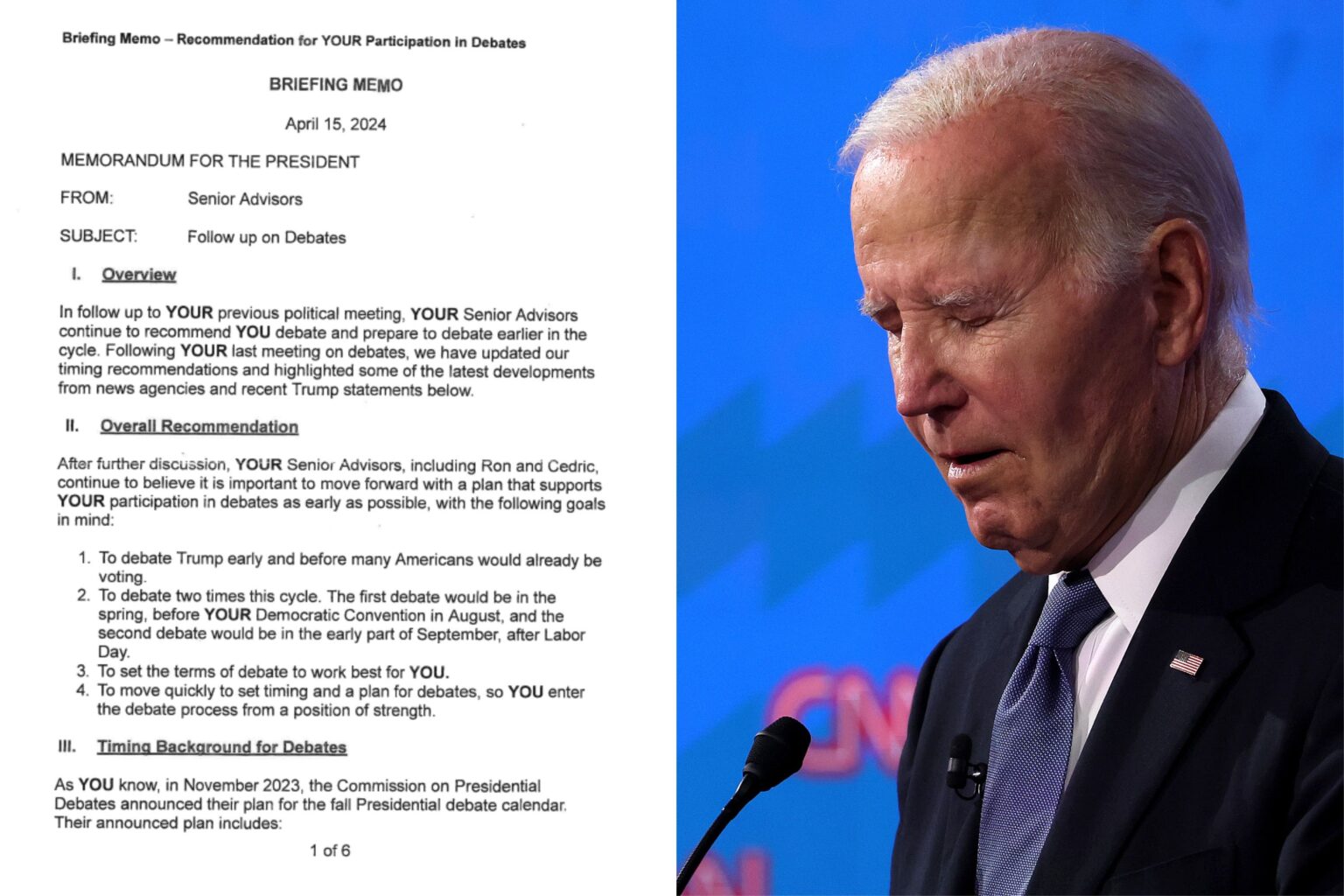What was meant to be Joe Biden’s defining moment in the 2024 campaign — an early debate to secure a second term by addressing concerns about his age and showing strength against Donald Trump — instead became a turning point that accelerated his political decline and led to his political nemesis’ comeback.
The risky strategy pushed by his senior advisers was largely to blame.
A six-page internal memo dated April 15, 2024, and titled Recommendation for YOUR Participation in Debates shows how carefully the campaign orchestrated the plan. The memo, obtained by journalists Josh Dawsey, Tyler Pager and Isaac Arnsdorf, features in their new book 2024: How Trump Retook the White House and the Democrats Lost America, which comes out Tuesday.
The memo, first published by Politico, argued that waiting for the traditional fall debate schedule would be too late. It recommended that Biden debate Trump “as early as possible” to reach voters before early ballots were cast in key states and before the race became mired in summer conventions and the Paris Olympics.
“Strategically holding these debates in the fall after many of the battleground states have already begun their early voting process and voter registration deadlines have passed is too late,” the memo states, recommending two debates: the first in late June and a second in early September.
The memo claimed that appearing alongside Trump early would allow Biden “to reach the widest audience possible … and stand next to Trump showing the strength of YOUR leadership compared to Trump’s weakness and chaos.”
It also recommended months of informal press Q&As, a taped campaign town hall in April and at least five days of intensive mock debates at Camp David. The memo noted that holding the first debate in June would give the campaign time to recover if the night went badly.
A Gamble That Backfired
The optimism with which Biden’s advisers approached the debate and their confidence that he still had the advantage to beat Trump has been dubbed one of the biggest miscalculations in modern American politics.
While some inside the campaign questioned whether the gamble was worth it, senior advisers pushed forward convinced that an early debate could silence doubts about Biden’s fitness and shift the race in his favor. Instead it intensified concerns about his fitness and sparked calls for him to step aside. He eventually did so weeks later, foreclosing the possibility of an ad hoc mini-primary that could have surfaced candidates to lead the ticket other than his vice president, Kamala Harris.
According to Original Sin, by journalists Jake Tapper and Alex Thompson, some aides worried Biden would struggle that night. Ron Klain argued forcefully “he has to debate” while Anita Dunn and Steve Ricchetti initially opposed the idea seeing little upside in sharing a stage with Trump, according to the book. Dunn reversed her position after Special Counsel Robert Hur’s report raised questions about Biden’s memory. Jen O’Malley Dillon pushed hardest for a June debate believing it was essential to make the election a choice rather than a referendum.
Even during preparations at Camp David the flaws in the strategy became evident. Biden arrived “rusty and exhausted,” slept through his first day and required frequent naps. His answers during practice sessions were described as halting, rambling and inconsistent.
One adviser admitted the team had lowered its expectations as his performance declined. “It’s true we were grading him on a curve every day,” the aide said. “Things that would have been considered a disaster in 2023 — by 2024 we would have said, ‘Okay, we got through that.'”
Despite weeks of preparation, the June 27 debate in Atlanta quickly unraveled from the moment the then-president arrived on stage. Biden’s delivery was weak, his answers scattered and his presence onstage failed to ease voter concerns. The very images his advisers had hoped would demonstrate strength — standing confidently next to Trump — instead reinforced doubts about his fitness.
Speaking to Newsweek after the debate, Carl Cavalli, a professor of political science at the University of North Georgia, said Trump “looked and sounded better” than Biden and that impression would stick. “I would not be surprised to see Trump take a clear lead in the polls in the coming days,” Cavalli said. “Not a huge lead but more than the back-and-forth we’ve seen.”
Indeed, he did.
The debate performance intensified scrutiny of Biden’s age and cognitive abilities. At the time, the White House originally said that Biden, then 81, had a cold. That explanation failed to stop what became a cascade of prominent Democrats and donors voicing concerns and eventually calling on the president to drop out. On July 10, actor and Democratic donor George Clooney published a New York Times op-ed urging Biden to step aside, a flashpoint that was widely seen as the beginning of the end of his reelection chances.
“The one battle he cannot win is the fight against time,” Clooney wrote.
The pressure culminated 11 days later, when Biden announced his withdrawal from the race and immediately endorsed Vice President Kamala Harris as the Democratic nominee. Harris eventually lost to Trump in November, decisively losing the popular vote and all seven swing states.
Read the full article here

